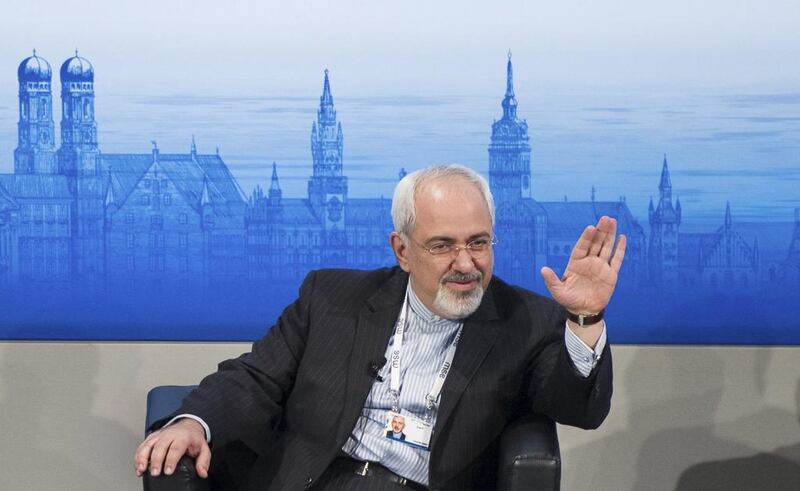MUNICH // Iran’s foreign minister on Sunday pledged good faith in talks to dispel western fears over Iran’s nuclear programme, after a rare meeting with the US secretary of state John Kerry.
Mohammad Javad Zarif said Iran would enter the next round of talks later this month “with political will and good faith to reach an agreement”.
It would be “foolish of us” and “a disaster for everyone” if the process did not lead to definitive results, Mr Zarif told a panel at the Munich Security Conference.
World powers hold another round of talks with Iran on February 18 after reaching an initial accord in November to curb uranium enrichment and open up nuclear facilities to allay concerns that Tehran is seeking to acquire atomic weapons.
Mr Kerry and Mr Zarif “discussed the upcoming negotiations with the P5+1 and the EU on a comprehensive agreement that will begin in Vienna”, a US state department official said.
The P5+1 groups the permanent five members of the UN Security Council – the United States, Russia, China, Britain and France – and Germany in talks with Iran.
“Kerry reiterated the importance of both sides negotiating in good faith and Iran abiding by its commitments under the Joint Plan of Action” agreed in November, the official said.
“He also made clear that the United States will continue to enforce existing sanctions,” he added.
Mr Zarif told the panel “it would be a major mistake for our friends to believe that we are here because sanctions have been effective”.
Rather, they had had the opposite effect and caused “a lot of resentment”, he said, describing a very large “trust deficit” in Iran that needed to be overcome.
Mr Zarif stressed that the election of Hassan Rouhani, a moderate, as president last year reflected Iranians’ desire for “a constructive engagement with the international community which will bring mutual respect”.
The Swedish foreign minister, Carl Bildt, told the panel there had been many missed opportunities in the past and this one had to be taken now.
He said it would be “truly criminal not to do everything” to make the talks succeed.
Tehran has always insisted its nuclear programme is for peaceful purposes.
But the West, unconvinced and worried by signs of possible atomic weapons development, imposed ever tighter sanctions hoping to stop Iran getting to a “break-out” point.
In November, Iran agreed with the P5+1 that it would roll back the programme and open it up to wider inspections.
In return, the world powers agreed to partially lift tough sanctions that have caused immense damage to the Iranian economy.
Last month, the United Nations nuclear watchdog, the IAEA, certified that Tehran had stuck to its side of the November deal, giving access to key nuclear installations and cutting back its enriched uranium stockpile.
Accordingly, the European Union and the United States began lifting some sanctions on January 20, laying the groundwork for the next, six-month stage of the negotiating process.
During this period, the United States and the European Union have promised to impose no new sanctions but have also made clear that most of them will remain in force pending further progress.
The accord provides ultimately for removing all the sanctions if Iran lives up to all its commitments and the western powers conclude it will not be able to acquire nuclear weapons.
Iran announced Saturday that it had received the first instalment out of a total US$4.2 billion (Dh15.4bn) to be unfrozen from foreign accounts under western sanctions, as agreed in November.
* Agence France-Presse





